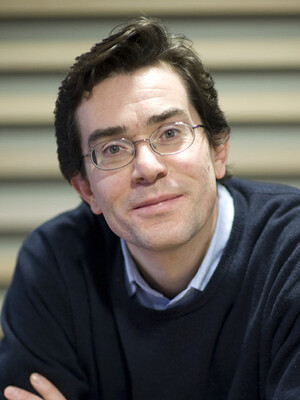QSC online Quantum training and Junior Day.
For QSC members, we will organise a Quantum Software Consortium (QSC) online training related to quantum internet. We are delighted to have Ronald de Wolf (Amsterdam) and Wolfgang Löffler (Leiden) as the key lecturers on Monday November 30 and in the morning of Tuesday December 1st.


Monday November 30
10:00 - 13:00: Ronald de Wolf - Applications for quantum internet (beyond QKD and CHSH).
10:00 - 10:45: Non-locality beyond CHSH
11:05 - 11:50: Quantum communication complexity
12:10 - 13:00: Quantum distributed computation
[3 x 45-minute lectures with 20-minute breaks in between]
13:00 - 14:00 : lunch @ home
14:00 - 17:00: Wolfgang Löffler - Quantum hardware for quantum networks: Spins and photons.
14:00 - 14:45: Single and entangled photons for quantum networks
15:05 - 15:50: Quantum memories: spins and spin-photon interfaces
16:10 - 17:00: From photons to superconducting qubits
[3 x 45-minute lectures with 20-minute breaks in between]
Tuesday December 1
Here we will do exercises about how we could in principle implement the software of Ronald's course using the hardware of Wolfgang's course.
10:00 - 11:20: Practice session I
11:20 - 11:40: Coffee break
11:45 - 13:00: Practice session II
13:00 - 14:00 : lunch @ home
2nd Junior Day on December 1
In the afternoon, the QSC PhD students from Leiden organise a second edition of the Junior Day:
14:00-15:00: Workshop by Julia Cramer (Leiden) on 'Science communication for quantum technology'.
* https://www.universiteitleiden.nl/en/staffmembers/julia-cramer#tab-1
15:00-16:00: Quantum pubquiz.
16:00-17:00: Online networking and lightning talks.
Ronald de Wolf - Applications for quantum internet (beyond QKD and CHSH)
Abstract:
This mini-course will describe some applications for a future quantum internet, beyond the well-known ones that have already been implemented, such as quantum key distribution and CHSH non-locality experiments. I plan to focus on three topics, spending about 45 minutes on each:
1. Non-locality beyond CHSH. CHSH has been implemented many times, the first loophole-free experiment was done in Delft in 2015. It requires only one shared EPR-pair, and is the simplest non-trivial non-locality experiment one can do. As quantum computers get bigger, we may also consider non-locality experiments that require more entanglement. We will describe some larger examples, such as the magic square game; a game that achieves nearly the best-possible quantum advantage from n-dimensional entanglement; and the three-party Mermin game.
2. Quantum communication complexity. In the simplest two-party case, Alice and Bob receive inputs x and y respectively, and want to compute some function f(x,y) with minimal communication between them. We will see some computational problems where quantum communication protocols are much more efficient than classical protocols, in particular a quadratic quantum advantage for the appointment-scheduling problem (which will return in the exercises on the second day), and an exponential improvement for the equality problem, using quantum fingerprints.
3. Quantum distributed computation. Here several computers in some network want to jointly compute some property, preferably in few rounds with small amounts of communication per round. We will describe some quantum speed-ups in this model, in particular a near-quadratic reduction in the number of rounds for computing the diameter of the network itself.
Wolfgang Löffler - Quantum hardware for quantum networks: Spins and photons.
Abstract:
In this mini-course we will discuss and explore the physics of quantum hardware, focussing on applications for quantum networks and a bit on computation. We will discuss three topics:
1. Single and entangled photons for quantum networks. Single photons are the obvious choice to distribute quantum information, and might even be used to directly build up large-scale entangled networks. We will discuss the deterministic generation of true single photons and briefly introduce photon quantum optics, and then focus on complex entangled states and their detection.
2. Quantum memories: spins and spin-photon interfaces. Quantum networks larger than possible by direct photon transmission require quantum repeaters. In this part we will discuss a few possible systems, mainly focussing on electron and nuclear spins appearing in crystals, such as the diamond NV center.
3. From photons to superconducting qubits. The recent Google breakthrough has shown that the control of large entangled quantum states is possible, in this part I aim to present briefly the superconducting qubit platform, compare to photonic approaches and how they could possibly be interfaced.
The registration closes at November 24, please register before.
